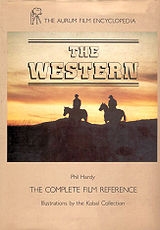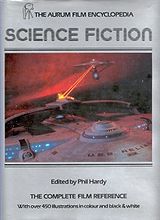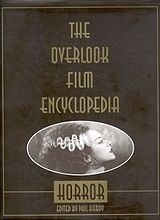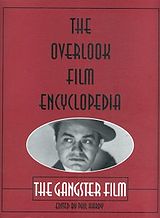
The Aurum Film Encyclopedia
Encyclopedia
The Aurum Film Encyclopedia is a multi-volume reference work
on cinema
, published in the UK
by Aurum Press
and edited by Phil Hardy
. The first volume, devoted to western films
, appeared in 1983, with eight subsequent volumes announced at that time as "forthcoming". However, as of 2007, only three additional entries have been issued. All four volumes have been published in the U.S.
by The Overlook Press
, with the same contents as the UK editions but with the title changed to "The Overlook Film Encyclopedia".
The Foreword
to all four volumes is the same, describing the proposed nine-volume encyclopedia as "covering the principal film categories or genres which have developed since the birth of the industry." The intent was to produce a "complete and authoritative" body of information that, upon completion, would be seen as "a truly comprehensive and enduring reference guide to the fabulous world of film."
Each book provides a decade by decade overview of that volume's respective genre
. Capsule reviews of individual films are provided per year of release. Each year's films are listed alphabetically, and feature brief cast and credit details.
Tim Lucas
described the first three volumes as "essential reference tools" and "eminently collectable as a set."
 Published in 1983, The Aurum Film Encyclopedia: The Western is a chronological history of the genre from 1930 - 1983. The book is credited solely to Phil Hardy, and all reviews are ostensibly his work alone. All subsequent volumes credit Hardy as editor, and provide a list of the contributing reviewers on the main title page. Hardy made the decision not to include any silent films in this first volume because, as he explained in his Preface
Published in 1983, The Aurum Film Encyclopedia: The Western is a chronological history of the genre from 1930 - 1983. The book is credited solely to Phil Hardy, and all reviews are ostensibly his work alone. All subsequent volumes credit Hardy as editor, and provide a list of the contributing reviewers on the main title page. Hardy made the decision not to include any silent films in this first volume because, as he explained in his Preface
, "space is at a premium" and "only a few silent Westerns are available for viewing." In addition, hundreds of “minor” sound westerns were not included in the main text, again because of noted space issues; the titles of all excluded sound films are provided in a massive, 20-page appendix entitled "All Other Sound Westerns". Many serials and Italian westerns
are relegated to this appendix. No such listing is provided for the missing silent films. Other appendices include a list of the top box office
western hits, top ten lists from critics, and all Academy Award-winning westerns.
A second edition of the book was published in 1991, with its chronology expanded through 1990 and a different set of appendices. Ten pages were added to the new edition, covering the few films produced during the years 1984 - 1990. This edition was reprinted in 1995.
 Published in 1984, The Aurum Film Encyclopedia: Science Fiction
Published in 1984, The Aurum Film Encyclopedia: Science Fiction
, followed the history of the genre chronologically, from 1897 – 1983. Unlike the previous volume, silent genre titles are included, and even minor genre films are reviewed in the main text. Also unlike the first volume, Hardy mentions the names of the various critics who provided the reviews in the text, which in this book were Denis Gifford
, Anthony Masters, Paul Taylor, and Paul Willemen. However, none of the film reviews are signed, so it is not possible to determine what material each writer contributed to the book. Like the first, this volume includes supplemental material including all-time box-office hits, critics’ top ten lists and all science fiction films that have won Academy Awards.
Tim Lucas wrote of the first edition that "no self-respecting film library should be without it", and further noted that it was "particularly recommended for its coverage of the early silent trick films
- perhaps the most complete document of its kind ever published."
An expanded second edition was published in 1995, with new entries on all films that had received a theatrical release through 1994. Longer by 62 pages than the original version, the edition dropped most of the appendices due to space issues.
 Published in 1984, The Aurum Film Encyclopedia: Horror
Published in 1984, The Aurum Film Encyclopedia: Horror
, provides a chronological history of the horror film since its inception in 1896 through 1983. Like the science fiction volume, all known theatrically released films, including those from the silent era, have entries. More than either of the two previous books, the horror volume is international in scope, providing coverage of all films from all countries that have ever produced a horror-related title. The contributors to this volume were Tom Milne
, Paul Willemen, Julian Petley, and Tim Pulleine. The writers' specific contributions are not possible to determine, as none of the film reviews are signed.
Tim Lucas has acclaimed the first edition as "the greatest and most influential of all books on the subject". In a later review, he described the book as "an intoxicating road map to further study and the enthusiasms of its authors(...)planted the seeds for the rediscovery and reappraisal of such cinéastes as Jesús Franco
, José Mojica Marins, Pupi Avati
, and Jean Rollin
...Hardy's hefty tome redefined how horror cinema was perceived by its admirers more so than any other single work..."
An expanded second edition was published in 1993, with new entries on all films released through 1992. This edition is approximately 90 pages longer than the first, with three of the appendices dropped for space reasons. As noted by Hardy in his Preface to the updated edition, Kim Newman
wrote nearly all of the book’s new material. This second edition was reprinted in 1995. Tim Lucas felt the second edition would probably disappoint many readers as it was not "as rich in international selection this time around", concentrating mainly on films produced in the United States and United Kingdom.
 Published in 1998, The Aurum Film Encyclopedia: The Gangster Film
Published in 1998, The Aurum Film Encyclopedia: The Gangster Film
follows the same basic format of the previous books, offering a chronological, decade-by-decade history of the genre. Hardy starts his history in 1928, noting in his introductory material that the genre did not exist prior to that. All films released through 1997 have capsule review entries. The contributors were Jeremy Clarke, Richard Coombs, David McGillivray
, Tom Milne, Kim Newman, Tim Pulleine, and Paul Willemen. As with previous volumes, the film reviews are unsigned, and so details regarding what material each writer contributed to the book has not been made available to the reader. The book has not been updated or reprinted.
, femmes fatales
, murderers, and serial killers. To date, no such volume has been published.
The first book in the series, The Western, had laid out the complete plans for all future volumes. In addition to the published Western, Science Fiction, and Horror volumes, the remaining six “forthcoming” books were to be: Comedy
, Romance
, War
, Epic
s, Musical
s, and Thrillers.
Reference work
A reference work is a compendium of information, usually of a specific type, compiled in a book for ease of reference. That is, the information is intended to be quickly found when needed. Reference works are usually referred to for particular pieces of information, rather than read beginning to end...
on cinema
Film
A film, also called a movie or motion picture, is a series of still or moving images. It is produced by recording photographic images with cameras, or by creating images using animation techniques or visual effects...
, published in the UK
United Kingdom
The United Kingdom of Great Britain and Northern IrelandIn the United Kingdom and Dependencies, other languages have been officially recognised as legitimate autochthonous languages under the European Charter for Regional or Minority Languages...
by Aurum Press
Aurum Press
Aurum Press is an independent English publishing house located in London. It was founded in 1976. Aurum concentrates on non-fiction titles and publishes approximately 75 new books every year. One of its titles in 2009 will be the biography of Neville Staple, vocalist in The Specials, Fun Boy...
and edited by Phil Hardy
Phil Hardy (journalist)
Phil Hardy is an English film and music industry journalist. He was born in Scarborough, Yorkshire in 1945 and studied at the University of Sussex, 1964-1969, during which time he was a visiting student at the Berkeley campus of the University of California . At Sussex he started The Brighton Film...
. The first volume, devoted to western films
Western (genre)
The Western is a genre of various visual arts, such as film, television, radio, literature, painting and others. Westerns are devoted to telling stories set primarily in the latter half of the 19th century in the American Old West, hence the name. Some Westerns are set as early as the Battle of...
, appeared in 1983, with eight subsequent volumes announced at that time as "forthcoming". However, as of 2007, only three additional entries have been issued. All four volumes have been published in the U.S.
United States
The United States of America is a federal constitutional republic comprising fifty states and a federal district...
by The Overlook Press
The Overlook Press
The Overlook Press is an American independent publishing house based in New York. It was formed in 1971 by Peter Mayer, who had previously worked at Avon and Penguin Books, where he was CEO from 1978 to 1998. A general-interest publisher, Overlook has over one thousand titles in print, including...
, with the same contents as the UK editions but with the title changed to "The Overlook Film Encyclopedia".
The Foreword
Foreword
A foreword is a piece of writing sometimes placed at the beginning of a book or other piece of literature. Written by someone other than the primary author of the work, it often tells of some interaction between the writer of the foreword and the book's primary author or the story the book tells...
to all four volumes is the same, describing the proposed nine-volume encyclopedia as "covering the principal film categories or genres which have developed since the birth of the industry." The intent was to produce a "complete and authoritative" body of information that, upon completion, would be seen as "a truly comprehensive and enduring reference guide to the fabulous world of film."
Each book provides a decade by decade overview of that volume's respective genre
Genre
Genre , Greek: genos, γένος) is the term for any category of literature or other forms of art or culture, e.g. music, and in general, any type of discourse, whether written or spoken, audial or visual, based on some set of stylistic criteria. Genres are formed by conventions that change over time...
. Capsule reviews of individual films are provided per year of release. Each year's films are listed alphabetically, and feature brief cast and credit details.
Tim Lucas
Tim Lucas
Tim Lucas is a film critic, biographer, novelist, screenwriter, blogger, and publisher/editor of the video review magazine Video Watchdog.-Biography and early career:...
described the first three volumes as "essential reference tools" and "eminently collectable as a set."
Volume One

Preface
A preface is an introduction to a book or other literary work written by the work's author. An introductory essay written by a different person is a foreword and precedes an author's preface...
, "space is at a premium" and "only a few silent Westerns are available for viewing." In addition, hundreds of “minor” sound westerns were not included in the main text, again because of noted space issues; the titles of all excluded sound films are provided in a massive, 20-page appendix entitled "All Other Sound Westerns". Many serials and Italian westerns
Spaghetti Western
Spaghetti Western, also known as Italo-Western, is a nickname for a broad sub-genre of Western films that emerged in the mid-1960s in the wake of Sergio Leone's unique and much copied film-making style and international box-office success, so named by American critics because most were produced and...
are relegated to this appendix. No such listing is provided for the missing silent films. Other appendices include a list of the top box office
Box office
A box office is a place where tickets are sold to the public for admission to an event. Patrons may perform the transaction at a countertop, through an unblocked hole through a wall or window, or at a wicket....
western hits, top ten lists from critics, and all Academy Award-winning westerns.
A second edition of the book was published in 1991, with its chronology expanded through 1990 and a different set of appendices. Ten pages were added to the new edition, covering the few films produced during the years 1984 - 1990. This edition was reprinted in 1995.
Volume Two

Science fiction film
Science fiction film is a film genre that uses science fiction: speculative, science-based depictions of phenomena that are not necessarily accepted by mainstream science, such as extraterrestrial life forms, alien worlds, extrasensory perception, and time travel, often along with futuristic...
, followed the history of the genre chronologically, from 1897 – 1983. Unlike the previous volume, silent genre titles are included, and even minor genre films are reviewed in the main text. Also unlike the first volume, Hardy mentions the names of the various critics who provided the reviews in the text, which in this book were Denis Gifford
Denis Gifford
Denis Gifford was a British writer. He specialized in the history of popular entertainments such as comic books and horror films...
, Anthony Masters, Paul Taylor, and Paul Willemen. However, none of the film reviews are signed, so it is not possible to determine what material each writer contributed to the book. Like the first, this volume includes supplemental material including all-time box-office hits, critics’ top ten lists and all science fiction films that have won Academy Awards.
Tim Lucas wrote of the first edition that "no self-respecting film library should be without it", and further noted that it was "particularly recommended for its coverage of the early silent trick films
Stop trick
A stop trick is a film special effect. It occurs when an object is filmed, then while the camera is off, the object is moved out of sight of the camera, then the camera is turned back on. When the film is watched it thus seems to the viewer that object disappears.Georges Méliès accidentally...
- perhaps the most complete document of its kind ever published."
An expanded second edition was published in 1995, with new entries on all films that had received a theatrical release through 1994. Longer by 62 pages than the original version, the edition dropped most of the appendices due to space issues.
Volume Three

Horror film
Horror films seek to elicit a negative emotional reaction from viewers by playing on the audience's most primal fears. They often feature scenes that startle the viewer through the means of macabre and the supernatural, thus frequently overlapping with the fantasy and science fiction genres...
, provides a chronological history of the horror film since its inception in 1896 through 1983. Like the science fiction volume, all known theatrically released films, including those from the silent era, have entries. More than either of the two previous books, the horror volume is international in scope, providing coverage of all films from all countries that have ever produced a horror-related title. The contributors to this volume were Tom Milne
Tom Milne
Tom Milne was a British film critic.After war service, he studied English and French at Aberdeen University and later at the Sorbonne...
, Paul Willemen, Julian Petley, and Tim Pulleine. The writers' specific contributions are not possible to determine, as none of the film reviews are signed.
Tim Lucas has acclaimed the first edition as "the greatest and most influential of all books on the subject". In a later review, he described the book as "an intoxicating road map to further study and the enthusiasms of its authors(...)planted the seeds for the rediscovery and reappraisal of such cinéastes as Jesús Franco
Jesús Franco
Jesús "Jess" Franco is a Spanish film director, writer, cinematographer and actor. His career took off in 1961 with his cult classic The Awful Dr. Orloff, which received wide distribution in the United States and England...
, José Mojica Marins, Pupi Avati
Pupi Avati
Giuseppe Avati, better known as Pupi Avati is an Italian film director, producer, and screenwriter.-Early life and career:...
, and Jean Rollin
Jean Rollin
Jean Michel Rollin Roth Le Gentil was a French film director, actor, and novelist best known for his films in the fantastique genre such as the vampire film Le Viol du Vampire and the first French gore film Les Raisins de la Mort .-Early life:Jean Rollin was born in Neuilly-sur-Seine , France to...
...Hardy's hefty tome redefined how horror cinema was perceived by its admirers more so than any other single work..."
An expanded second edition was published in 1993, with new entries on all films released through 1992. This edition is approximately 90 pages longer than the first, with three of the appendices dropped for space reasons. As noted by Hardy in his Preface to the updated edition, Kim Newman
Kim Newman
Kim Newman is an English journalist, film critic, and fiction writer. Recurring interests visible in his work include film history and horror fiction—both of which he attributes to seeing Tod Browning's Dracula at the age of eleven—and alternate fictional versions of history...
wrote nearly all of the book’s new material. This second edition was reprinted in 1995. Tim Lucas felt the second edition would probably disappoint many readers as it was not "as rich in international selection this time around", concentrating mainly on films produced in the United States and United Kingdom.
Volume Four

Crime film
Crime films are films which focus on the lives of criminals. The stylistic approach to a crime film varies from realistic portrayals of real-life criminal figures, to the far-fetched evil doings of imaginary arch-villains. Criminal acts are almost always glorified in these movies.- Plays and films...
follows the same basic format of the previous books, offering a chronological, decade-by-decade history of the genre. Hardy starts his history in 1928, noting in his introductory material that the genre did not exist prior to that. All films released through 1997 have capsule review entries. The contributors were Jeremy Clarke, Richard Coombs, David McGillivray
David McGillivray (director)
David McGillivray is an actor, producer, playwright, screenwriter and film critic.Originally a critic for Monthly Film Bulletin, McGillivray wrote his first film script, Albert's Follies, for friend Ray Selfe in 1973...
, Tom Milne, Kim Newman, Tim Pulleine, and Paul Willemen. As with previous volumes, the film reviews are unsigned, and so details regarding what material each writer contributed to the book has not been made available to the reader. The book has not been updated or reprinted.
Future volumes
In his introduction to The Gangster Film, Hardy noted that work on a crime-themed “companion work” to that volume was in preparation. This book was to be devoted to private eyesPrivate investigator
A private investigator , private detective or inquiry agent, is a person who can be hired by individuals or groups to undertake investigatory law services. Private detectives/investigators often work for attorneys in civil cases. Many work for insurance companies to investigate suspicious claims...
, femmes fatales
Femme fatale
A femme fatale is a mysterious and seductive woman whose charms ensnare her lovers in bonds of irresistible desire, often leading them into compromising, dangerous, and deadly situations. She is an archetype of literature and art...
, murderers, and serial killers. To date, no such volume has been published.
The first book in the series, The Western, had laid out the complete plans for all future volumes. In addition to the published Western, Science Fiction, and Horror volumes, the remaining six “forthcoming” books were to be: Comedy
Comedy film
Comedy film is a genre of film in which the main emphasis is on humour. They are designed to elicit laughter from the audience. Comedies are mostly light-hearted dramas and are made to amuse and entertain the audiences...
, Romance
Romance film
Romance films are love stories that focus on passion, emotion, and the affectionate involvement of the main characters and the journey that their love takes through courtship or marriage. Romance films make the love story or the search for love the main plot focus...
, War
War film
War films are a film genre concerned with warfare, usually about naval, air or land battles, sometimes focusing instead on prisoners of war, covert operations, military training or other related subjects. At times war films focus on daily military or civilian life in wartime without depicting battles...
, Epic
Epic film
An epic is a genre of film that emphasizes human drama on a grand scale. Epics are more ambitious in scope than other film genres, and their ambitious nature helps to differentiate them from similar genres such as the period piece or adventure film...
s, Musical
Musical film
The musical film is a film genre in which songs sung by the characters are interwoven into the narrative, sometimes accompanied by dancing. The songs usually advance the plot or develop the film's characters, though in some cases they serve merely as breaks in the storyline, often as elaborate...
s, and Thrillers.

